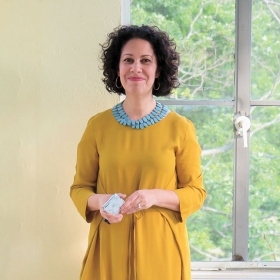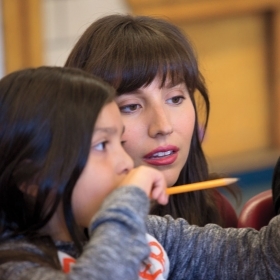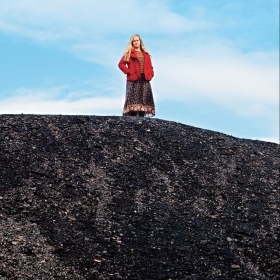Dotted along the northeastern-most coastline of the United States sit some of the most geographically isolated communities in the country. It’s here in Washington County that Gigi Georges ’88 spent more than four years following a group of high-school girls as they navigated coming of age in the tight-knit, economically depressed, and opioid-ravaged world of Downeast Maine. But amid the challenges of Downeast life, Georges highlights how these girls are carving a path for themselves and for the future of their communities.
How did you decide to focus on these particular girls?
I sat down with a number of students in informal focus groups. Almost immediately, I had this “aha” moment: The girls there were excelling and, in most cases, surpassing the boys in academics, athletics, extracurriculars, and leadership within and beyond the school. I also realized, after examining a range of published literature, that the voices of contemporary young women in rural America were largely absent. I asked five young women if I could profile them as a group, because I believed, based on my interviews and the high school principal’s guidance, they broadly exemplified life in this rural place.
What from your research struck you most powerfully?
My biggest takeaway—and one that forms the core of the book’s message—is that communities like those in Downeast Washington County are thriving despite significant challenges, and that young women in particular are at the center of helping sustain their communities. In fact, in my four years of reporting on these young women, their families, friends, teachers, and mentors, I realized that many young women are committed to remaining in or returning to their hometowns to build their lives, even when they have the choice to leave. They are remarkably resilient, invested in their hometowns, and deeply connected to the land and sea around them. The arc of their stories runs counter to the conventional narrative of a brain drain from rural places—and bodes well for the future of rural America.
How did the girls react to the book?
We’ve all kept in touch. I’ve been so pleased and honored by their positive reactions—and by the support and embrace of Downeast’s message of hope, resilience, and community strength by so many in the broader Downeast Washington County region. I am so grateful to all five young women for their trust and friendship, earned over the four years I spent reporting for the book. Throughout those years, I checked and rechecked my facts and the narrative’s broader direction with them. All five also read and signed off on their sections prior to publication. It was extremely important to me that they were comfortable with my depiction of their stories.
Bader is based in Portland, Maine, and covers health care for the Lewiston Sun Journal.







We ask that those who engage in Wellesley magazine's online community act with honesty, integrity, and respect. (Remember the honor code, alums?) We reserve the right to remove comments by impersonators or comments that are not civil and relevant to the subject at hand. By posting here, you are permitting Wellesley magazine to edit and republish your comment in all media. Please remember that all posts are public.